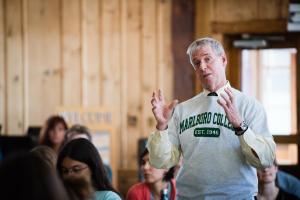View from the Hill
Growing from the Same Soil
By Kevin Quigley
 This spring there will be some momentous changes on Potash Hill, and I’m not talking about mud season. Nearly two decades after it was established, the graduate and professional studies (GPS) program will be relocating from downtown Brattleboro to our Marlboro campus. Although the grad school was created with a different operating style, relying on internet-based, distance learning—ideal for mid-career students—there are surprising similarities in mission, values, and pedagogy. Both the graduate and undergraduate programs clearly grow from the same Potash Hill soil.
This spring there will be some momentous changes on Potash Hill, and I’m not talking about mud season. Nearly two decades after it was established, the graduate and professional studies (GPS) program will be relocating from downtown Brattleboro to our Marlboro campus. Although the grad school was created with a different operating style, relying on internet-based, distance learning—ideal for mid-career students—there are surprising similarities in mission, values, and pedagogy. Both the graduate and undergraduate programs clearly grow from the same Potash Hill soil.
I am sure that all Marlboro College community members can relate to GPS’s overarching goal of helping students develop a life of passion and purpose. In the words of Kate Jellema, associate dean for graduate and professional studies, the graduate program “advances the college’s progressive values, commitment to engaged citizenship, and inquiry-based pedagogical approach through its focus on teacher training and progressive business education.”
Much like Marlboro’s undergrad students, the college’s grad students have a calling to make positive change in the world. While these aspirations are shared across the programs, GPS students have a clearer sense of their path for making change: as teachers, entrepreneurs, managers, or leaders and innovators in the social sector. At GPS, students gain the practical skills and professional experience they need to channel their passion, intelligence, and curiosity into impactful careers and purpose-driven lives.
Relocating GPS to Potash Hill will allow for far more synergy between our graduate and undergraduate programs. It will provide greater opportunities for students to take advantage of our accelerated master’s track, which enables them to take graduate classes while still an undergraduate and complete a master’s degree within a year or two of graduation. The move will also present new opportunities for our graduate students, enabling them to have access to our remarkable Rice-Aron Library and our outstanding Outdoor Program offerings. We look forward to having graduate students cross-country skiing on Town Trail, kayaking on South Pond, or participating in many other activities that get students outdoors in these beautiful green hills of Vermont.
Perhaps most importantly, moving GPS to Potash Hill will enrich educational offerings for both undergraduate and graduate students—for example, through short workshops taught by graduate students. Also, as the college deepens its career-related programming, greater exposure to working professionals who can be role models and mentors should prove an added benefit for undergraduates.
In February, the grad school offices moved to “On the Way,” a wonderful house in the woods off South Road (see Giving In Action, Winter 2016). The graduate students’ first residential weekend is in March, during the undergraduate program’s spring break. In mid-April, the undergraduate and graduate students will share our lovely campus for the first time. Please join me in welcoming the grad school and its students to Potash Hill, and supporting a successful relocation that strengthens Marlboro College and improves the learning environment for all of our students.
Learn more about the move, including the role of the Integration Committee in facilitating the transition process, at marlboro.edu/gpsmove.
